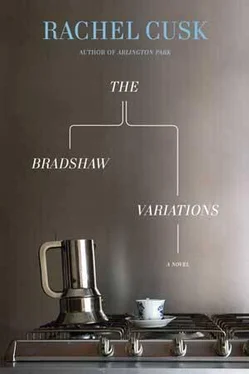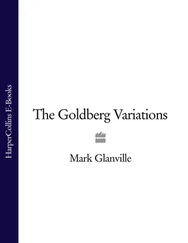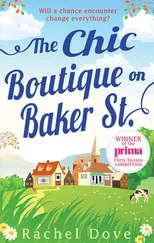‘Look at the ducklings,’ she says to her mother. ‘Look at the little eggs in the nest.’
Her mother is silent. She is staring at the river, at the swan. She stares and stares.
‘Look at the dragonfly,’ Alexa says.
The dragonfly hovers, blue and glinting. The bulrushes are tall and straight, perfectly brown and rounded at their ends. The kingfisher plunges. The swan curves her white neck like a ballerina. The painted river sparkles.
Olga has met a man. He is a porter at the hospital. His name is Stefan. One day, in the tearoom, he asked her where she came from and when she told him the name of her home town he leaped in the air and shouted, ‘My God!’, so that she thought he must come from there too. But he is only Lithuanian. She still doesn’t know why he got so excited. He is six-and-a-half feet tall. It is important, when a man that tall throws himself in the air.
The supervisor has moved Olga to the place where women come to have their babies. Before, she cleaned in the old people’s wards, the big quiet rooms far inside the maze of the building where the windows don’t look out at anything, just brick walls or stairwells or the vents and pipes of the hospital heating system, as though someone decided that these old people didn’t need to see the world any more because they were about to leave it anyway. The old ladies would lie in their beds, all white and tiny and soft, like wrinkled little fairies. They were no trouble to anyone. They lay there like babies in their cots under the bright overhead lights, with just a few trinkets beside them: a photograph in a frame, a card, a magazine. They had so little, less than people take with them in their handbags when they go out to the shops. The white lights interrogated them, clarified them in their poverty, rinsing and rinsing each object of its significance until the photograph and the card seemed to have hardly any right to be there, impeding the encroaching whiteness. Olga would dust their trinkets for them, set them square and triumphant on the bedside tables again, smooth the covers of the magazines.
The maternity place isn’t like that at all. The women here have giant, lurid bunches of flowers and bowls of exotic fruit, and presents, always more presents, new items the mothers carelessly husk of their packaging, discarding it for Olga to pick up. She picks up the torn shapes of brightly coloured paper, the gold ribbons, the tags and labels, the rustling plastic shrouds in which the new things came encased. She takes these things, so recent and yet so superfluous, and she crams them into her black rubbish sack. Next to the beds the babies writhe like naked grubs in their perspex boxes. At the end of her shift the rubbish sack is full, full of weightless crackling wastage, chemical-fresh and nameless. There are no words for the kinds of rubbish Olga picks up. It is strange, that new life should come into the world garlanded in nameless rubbish.
The corridors outside the labour rooms echo with terrible screams. Olga pushes her mop there, at the closed doors. Inside, the women bellow like animals. Stefan works in these corridors: he wheels the patients on trolleys in and out. This is how she sees him, pushing the suffering ladies towards their destiny, their release; and then retrieving them, limp and tangled and silent, the baby clamped like a grub to their breast. His tall, upright form seems to preside over their suffering, almost to describe it, as the artist’s brush describes the image it is painting: impassive in himself, he nonetheless finds himself there, at the fulcrum of creation, guided by an unseen hand. He distributes its shapes and properties; he passes in and out of the birthing chamber, besmirched by creation.
But in the pub, showered and changed out of his hospital uniform, his functionality clears like mist; his authority is restored, the clean authority of the brush, the tool. He says,
‘This is a bad country.’
Over the weeks Olga has unravelled her woes to Stefan, her loneliness and bewilderment, her exhaustion and superstition, the feeling she has that in this place she is drawing evil towards herself, attracting it as blindly as a magnet attracts steel; the whole tale lies at his feet, undone.
‘Why should it be worse than other countries?’ she says.
He nods, raises his hand: he has already considered this.
‘It is our position here that brings out the bad. Like the mouse brings out the bad in the cat.’
Olga is frightened. She wants to hear that her problems will disappear. She does not want to think of them as inalienable, like the mouse and the cat. And she dislikes mice: at home she has a beautiful cat, Mino, who catches mice and eats them whole. She has watched, disgusted and fascinated, the toothpick legs and tail wriggling madly at Mino’s lips even as the head was already down his throat. Afterwards he would wind himself around her legs, purring; he would gaze at her with his clear, calm, staring eyes. He was referring his superiority to her; he was claiming kinship, the kinship of superior beings.
‘It takes time,’ Olga says. ‘Maybe a long time.’
Stefan is shaking his head. ‘We can be here a hundred years and we still won’t belong,’ he says.
‘Maybe we don’t need to belong. Maybe we just want to live.’
All at once he has reminded her: of the limited town, the grey colours that seeped into her brain and stained it, the feeling everywhere of defacement, of everything being known and defaced, herself spoilt and defaced by others’ knowledge of her. And the terrible certainty of repetition, her grandmother and mother and sister, replicas of one another, using and reusing the same grey rag of life. Lately, a feeling of yearning has stolen over her, for her home town and her family. It has been stealthily painting out the greyness, this feeling; it has been going over her memories and painting them in rainbow colours. In Poland, she used to imagine in these same rainbow colours what her life would be like elsewhere. Now she is here, imagining again.
‘As servants,’ Stefan says. ‘As outsiders. But as equals, never.’ He points at her with his long, strong finger. ‘You, a qualified teacher in Poland, a university degree, high social status, and what do they let you do here? They let you wash the floors.’
‘I earn more here in one week than in one month at home,’ Olga says. ‘And anyway, they treated me like a servant before. In Poland, a teacher is less than a cleaner. Less!’
On this point Olga retains a foothold in reality, when all the rest has become bodiless, rainbow-coloured myth. She does not want Stefan to succumb here, where the danger is greatest. She does not want him to slip away into illusion and leave her all alone with her one bitter certainty.
‘But as a teacher you have dignity,’ he says. ‘You have self-respect.’
‘I had no respect. The parents did not respect me and neither did their children. I hated them!’
He raises his eyebrows, purses his lips.
‘Even if I go back to Poland, I will never again be a teacher,’ she says.
And as she says it, her foothold crumbles imperceptibly away. She is released, into the memory of crisp snow on winter streets, of her grandmother’s warm kitchen, of the hot flat days of summer, of familiar sounds and smells; of herself moving, acknowledged, through the landscape, being seen and known, her friends and family crowding round her at every turn, calling her name. Olga! Olga! Suddenly it seems clear what the problem was, the blockage. If she goes back to Poland she will get a job in a bank, and everything will be different. She sees herself sitting behind the cashier’s window, in a tailored suit and high-heeled shoes. She sees herself smiling, showing her straightened teeth.
Читать дальше












